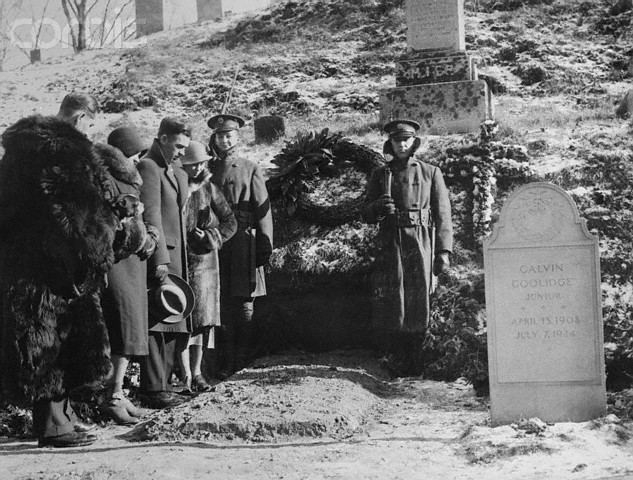Eighty-six years ago today, the nation was stunned to learn that former President Coolidge had joined his father, his son, and their ancestors in death. It had begun as a fine, clear day with the only indications that Mr. Coolidge came home early from the office for the second day in a row, feeling poorly – noting another bout of indigestion, a not uncommon complaint through the years. He had remarked the day before to Mr. Ross, his secretary, that perhaps they would work from home from now onward.
They met Mrs. Coolidge leaving for a walk downtown on that bright morning. Cal offered her the car but she wanted the exercise. It was such a fine day for it being winter in Northampton. She would casually pass the shop of the local dressmaker, Ralph Lerch, and decide she ought to acquire a black dress. Its import would soon be obvious.
Coolidge, more restless than usual, conversed with Mr. Ross for a time, went to the kitchen for a glass of water, spoke to the gardener, and tinkered with a few pieces of a puzzle of George Washington he had been working on over the last few days. Nothing seemed to quite help pinpoint what had him out of sorts. He went upstairs to shave. There Mrs. Coolidge found him, with upturned sleeves and straight razor prepared, fittingly having left her in the midst of the same task she had witnessed so many years ago on the day they first met.
The service was simple, unfettered by elaborate display and a steadfast refusal to orchestrate anything close to a state funeral. In twenty minutes the service at their hometown congregation was over. The occasion opened with “Lead Kindly Light”:
Lead, kindly Light, amid th’ encircling gloom,
Lead Thou me on;
The night is dark, and I am far from home,
Lead Thou me on;
Keep Thou my feet; I do not ask to see
The distant scene; one step enough for me.
I was not ever thus, nor prayed that Thou
Shouldst lead me on;
I loved to choose and see my path, but now
Lead Thou me on;
I loved the garish day, and spite of fears,
Pride ruled my will; remember not past years.
So long Thy pow’r has blest me, sure it still
Wilt lead me on,
O’er moor and fen, o’er crag and torrent, till
The night is gone,
And with the morn those angel faces smile,
Which I have loved long since, and lost awhile.
Then, “O Love That Will Not Let Me Go”:
O Love that will not let me go,
I rest my weary soul in thee;
I give thee back the life I owe,
That in thine ocean depths its flow
May richer, fuller be.
O Light that foll’west all my way,
I yield my flick’ring torch to thee;
My heart restores its borrowed ray,
That in thy sunshine’s blaze its day
May brighter, fairer be.
O Joy that seekest me through pain,
I cannot close my heart to thee;
I trace the rainbow through the rain,
And feel the promise is not vain,
That morn shall tearless be.
O Cross that liftest up my head,
I dare not ask to fly from thee;
I lay in dust life’s glory dead,
And from the ground there blossoms red
Life that shall endless be.
Hymns were followed by the reading of Scripture (Psalm 46, Psalm 121, Romans 8, 2 Corinthians 5, and John 14), reminding each that not only is God “our refuge and strength” but also “a very present help in trouble.”
I will lift up mine eyes unto the hills, from whence cometh my help.
My help cometh from the Lord, which made heaven and earth.
He will not suffer thy foot to be moved: he that keepeth thee will not slumber.
Behold, he that keepeth Israel shall neither slumber nor sleep.
The Lord is thy keeper: the Lord is thy shade upon thy right hand.
The sun shall not smite thee by day, nor the moon by night.
The Lord shall preserve thee from all evil: he shall preserve thy soul.
The Lord shall preserve thy going out and thy coming in from this time forth, and even for evermore.
Handel’s Largo from Xerxes brought the occasion to a close. A smaller procession traveled the wet and unpaved roads up to the Notch cemetery, where his body, in unadorned silver casket, was borne up the hill to its current rest.
Only the Presidential seal on his stone and the playing of taps at the grave site distinguished this personage as someone of great importance. Prayer and poetry brought the gathering there to a close, as Mrs. Coolidge recited lines adapted from Australian Robert Richardson’s “Annette,” written in the 1890s, in words subsequently borrowed by Mark Twain for his tomb:
Warm summer sun, shine kindly here,
Warm summer wind, blow softly here;
Green sod above, lie light, lie light,
Good night, dear heart, good night, good night.

Photo Credit: Corbis.
Good night and goodbye, Mr. Coolidge! We miss you still.




Stirring tribute, Daniel. I appreciate each and every detail you’ve shared about this most appropriately observed occasion.
Thank you!
Excellent post!
Thank you!